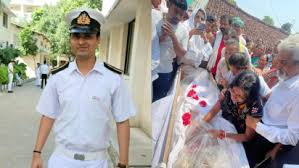A marine engineer’s death in Iran, a misidentified body, and Jharkhand family’s endless wait for compensation

The tragic death of Alakh Nandan Mahto, a young marine engineer from Jharkhand, reveals the harsh realities migrant workers and their families face after overseas tragedies. His story involves loss, bureaucratic errors, and a long fight for compensation.
The Tragedy at Sea
Alakh Nandan Mahto came from Tartara village in the Manoharpur block of West Singhbhum district, Jharkhand. After finishing his Graduate Marine Engineering course, he began working on the MV Rasa, a ship managed by BND Yat Ship Management Services, in August 2024.
On March 27, 2025, he died in a tragic accident aboard the vessel docked at Charak Port in Iran. The accident’s details remain unclear, but his death devastated his family and community.
The Painful Mistake: Wrong Body Returned
Families of migrant workers face immense grief and logistical challenges after a death abroad. The Mahto family’s pain deepened due to a shocking error.
After over a month’s wait, the family received a body at Kolkata airport, expecting closure and a chance for last rites. However, when they opened the coffin at home, they found it was not Alakh. Instead, it was Shivendra Pratap Singh’s, another crew member from Uttar Pradesh who also died in the accident.
The repatriation process mistakenly swapped the two bodies. The family could not view the body at the airport, missing an opportunity to catch the error earlier. Raghu Mahto, Alakh’s brother, had to personally transport the wrong body to Uttar Pradesh and then return to finally receive Alakh’s remains. This ordeal delayed their mourning and increased their suffering.
Bureaucratic Battle for Compensation
The Mahto family’s fight did not end after they recovered Alakh’s body. They entered a prolonged struggle with authorities over compensation.
The Jharkhand International Migrant Worker Grant Scheme provides ₹5 lakh as ex-gratia to families of migrant workers who die abroad. This scheme aims to ease financial burdens after such tragedies.
However, the local district labor department rejected the Mahtos’ application. Officials said their annual household income exceeded the scheme’s ₹72,000 limit. The family found this decision unfair and distressing.
Raghu Mahto argued that they faced heavy expenses to repatriate Alakh’s body. He cited travel, legal fees, and emotional trauma. He criticized the income-based eligibility rule, saying it ignored real costs and hardships families endure.
Questioning Accountability
Alakh’s case raised serious questions about responsibility at various levels—from the shipping company to government agencies.
The Directorate General of Shipping (DG Shipping) acknowledged the incident. They blamed confusion on discrepancies in vessel records and contacted foreign missions and insurance firms like the Protection and Indemnity (P&I) Club.
Despite this, the family remained suspicious. They pointed out that the shipping company continued operating after losing its license in late 2024. This raised concerns about enforcement and worker safety.
The Indian embassy in Iran also faced criticism. The family accused embassy officials of negligence for failing to verify the bodies’ identities before shipment. This oversight worsened the family’s grief.
Larger Issues Facing Migrant Workers
Alakh’s story is not unique. Many migrant workers face similar vulnerabilities when working abroad. They risk exploitation and often lack support if accidents or deaths occur.
Migrant laborers leave families behind who depend on their income. Yet when tragedy strikes, families struggle with complex paperwork, inconsistent policies, and limited help.
Mistakes like misidentified bodies and delayed compensation reveal systemic gaps that urgently need fixing.
Calls for Reform
The Mahto family’s struggle highlights the need for reforms to protect migrant workers better. Key areas for improvement include:
- Stricter oversight of shipping companies to ensure safety and compliance.
- Clear and compassionate repatriation procedures with accurate body identification.
- Flexible compensation criteria that consider actual costs, not just income.
- Support systems offering counseling, legal aid, and financial help to families.
Their ordeal should prompt policymakers and industry leaders to build a fairer, more accountable system for migrant workers.
Conclusion
The death of Alakh Nandan Mahto devastated his family and community. The mistaken identity of his body and the fight for compensation only deepened their pain.
This story reflects the hardships many migrant workers’ families face—caught in bureaucracy and neglect. It calls for urgent action to improve protections and ensure dignity and justice for those who risk their lives far from home.






